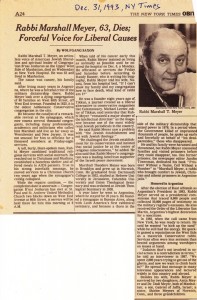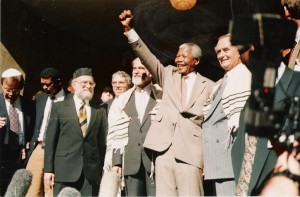Dec. 6 Update: As of noon today, the NY Times article about the expression of support for the UN’s endorsement of Palestinian statehood by the rabbis and board at B’Nai Jeshurun was the most emailed story on the Times website. Also, for any readers of this blog who would like to discover more about Marshall Meyer, my friend and longtime BJ member Jane Isay reminds me of Marshall’s posthumous book You Shall Be My Witness, which she edited with Marshall’s widow, Naomi.
—
Though I have not officially been a congregant for the past several years, I was for more than a decade (1985-97) an active member of Congregation B’Nai Jeshurun, a Manhattan synagogue. Its lead rabbi during the years I was active, until his untimely death in 1993, was Marshall T. Meyer. I met Marshall in 1985, shortly after he returned to the United States from Argentina following a lengthy sojourn as a rabbi there, during which time he became an outspoken critic of the military junta that imprisoned, tortured, and ‘disappeared’ thousands of people they deemed opponents in the country’s “dirty war.” The dedication of the searing 1981 book, Prisoner Without a Name, Cell Without a Number, by Argentine activist and former prisoner Jacobo Timerman, reads,
To Marshall Meyer
A rabbi who brought comfort
to Jewish, Christian, and atheist prisoners in
Argentine jails.
After the murderous generals fell from power, Marshall served on the national commission that investigated and chronicled the full range of crimes and abuses they had committed, the only non-Argentine to do so. He told me in sadness that after his service on that body he found he could no longer be an honest pastoral counselor to victims’ families, having learned disturbing details of the torture prisoners endured; he felt torn between sharing what he knew when grieving survivors asked him about their relatives’ last days. Wanting to spare them more agony, they sensed he knew more than he could say. Marshall–who as a rabbinical student worked with spiritual giant Abraham Joshua Heschel, typing several of his book manuscripts prior to publication–had a big personality and was unflinchingly vulnerable. He gave and received a lot of hugs. When he returned to the States from Argentina, he soon became rabbi of B’Nai Jeshurun, then a moribund Manhattan congregation, and within a short time had made it one of the most vital synagogues in New York City. It even gained a nickname, ‘BJ.’ During his tenure, Marshall recruited two younger rabbis to serve alongside him there, Roly Matalon and Marcelo Bronstein–from Argentina and Chile, respectively–who fully took the helm after his wrenching death, at only age 63. Though I’m not much involved with the congregation these days, I still consider myself a sort of lay disciple of Marshall’s, and a friend to Roly and Marcelo and to the congregation.
As a reading of Marshall’s NY Times obituary will attest, provided here in a link and below as a scan of my original clipping, Roly and Marcelo carry on Marshall’s committed rabbinate. The NY Times reports tonight that the two rabbis, along with BJ’s longtime musical director, Cantor Ari Priven, and rabbinical colleague Felicia Sol, and the institution’s board, have made public an open letter they wrote, seconding the UN’s vote last week that endorsed Palestinian statehood. The Times article reprints the entire letter, as I will do too.
—
Dear Friends,
Yesterday’s vote at the UN on Palestinian membership was a day which will go down in history, although what history will write about it only time will tell.
In this week’s Parashat Vayishlach, Jacob battles with the angel and earns the name Israel. It is the first time we are recognized as the people of Israel. Our own struggles were rewarded exactly 65 years ago on 29 November 1947 with the UN partition plan that acknowledged the right of the Jewish people to an independent state.
The Parasha also tells us how Jacob prepares to meet his brother Esau again, 20 years after fleeing from him. The risks are real — Esau has threatened to kill him. This meeting is the biblical prototype of confrontation between Israel and the nations. Before the meeting with Esau, Jacob prepares in three ways: he divides his camp in two, he prays to God, and he sends Esau gifts and conciliatory messages. These three tactics mirror the basic strategies that Israel has at its disposal: preparation for battle, prayer, and diplomacy.
We as a nation have had to rely on all three at different times. Today we feel it is critical that we remember the crucial role that diplomacy played in achieving independence for the State of Israel.
The vote at the UN yesterday is a great moment for us as citizens of the world. This is an opportunity to celebrate the process that allows a nation to come forward and ask for recognition. Having gained independence ourselves in this way, we are especially conscious of this. Every people has the right of recognition, every person has the right of recognition.
As Jews deeply committed to the security and democracy of Israel, and in light of the violence this past month in Gaza and Israel, we hope that November 29, 2012 will mark the moment that brought about a needed sense of dignity and purpose to the Palestinian people, led to a cessation of violence and hastened the two state solution.
We continue to pray for a lasting peace between Israel and her neighbors.
—
As soon as I read about what they’d done at BJ, I tweeted this out with the link to the Times piece:
Philip Turner @philipsturner
Proud of NYC’s Cong B’Nai Jeshurun, its rabbis&board for boldly voicing support of UN vote for Palestinian statehood. http://nyti.ms/UEwkGK
—
Now I’m happy to share the news even more widely, here on this blog. For the record, I will state that I believe in co-existence and a two-state solution as the best hope for resolving the decades-long conflict between Israelis and Palestinians. I’m grateful to have known and shared a deep friendship with Marshall, and appreciative of the legacy that his successors faithfully carry on at BJ.






